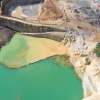In June 2010, the Dodd-Frank Wall Street Reform and Consumer Protection Act was passed in the United States (see also “Conflict Resources Reach Wall Street”, ECC-Platform edition August 2010). With this law, companies - among them some of the world’s largest extractive industry companies - were asked to publish details of the payments made to governments for mining activities. At the end of October, the European Commission proposed to follow this example.
In the past, only a few natural-resources-exporting countries have gained sustainable benefits for the country. Quite the opposite is true in many cases: countries like the Democratic Republic of Congo are poor, fragile, and conflict-prone. Due to high degrees of corruption and prevailing governance deficits, major parts of the population are excluded from potential development gains.
To break this resource curse, a transparent market is a first step. The Commission is proposing that in the future, companies active in the oil, gas or mining sector must publicly disclose their payments to governments for each project in which they invest. To this end, amendments of existing directives on market transparency and corporate accounting will be needed. Global Witness, a well-known resource watchdog, welcomed the Commission’s initiative: “We welcome the leadership of the EC’s President Barroso and Commissioner Barnier and the strong support of Britain and France for a proposal which could make a profound difference to many resource-rich-but-poor countries,” said Simon Taylor, Founding Director of Global Witness.
Already in May of this year, the OECD and developing economies agreed - as the first inter-governmental agreement in this area - on new guidelines to promote more responsible business conduct by multinational enterprises, and a second set of guidances to limit the use of conflict minerals. The updated guidelines list new recommendations on corporate responsibility for their supply chains. The proposed rules can further strengthen transparency initiatives like the Extractive Industries Transparency Initiative (EITI) by extending its scope to all resource-rich countries. It remains to be seen in which way the European Parliament and EU member states agree on ambitious rules. Nevertheless, nearly ten years after the announcement of EITI, action on conflict resources seems to have entered a new stage. (Dennis Taenzler)
The ECC article “Conflict Resources Reach Wall Street” is available here.
For the press release by the European Commission, please see here.
For the press release by Global Witness, please see here.
The OECD press release on the new guidelines is available here.
Published in: ECC-Newsletter, 6/2011
Toward Transparent Resource Use? Europe to Follow the US Example
In June 2010, the Dodd-Frank Wall Street Reform and Consumer Protection Act was passed in the United States (see also “Conflict Resources Reach Wall Street”, ECC-Platform edition August 2010). With this law, companies - among them some of the world’s largest extractive industry companies - were asked to publish details of the payments made to governments for mining activities. At the end of October, the European Commission proposed to follow this example.
In the past, only a few natural-resources-exporting countries have gained sustainable benefits for the country. Quite the opposite is true in many cases: countries like the Democratic Republic of Congo are poor, fragile, and conflict-prone. Due to high degrees of corruption and prevailing governance deficits, major parts of the population are excluded from potential development gains.
To break this resource curse, a transparent market is a first step. The Commission is proposing that in the future, companies active in the oil, gas or mining sector must publicly disclose their payments to governments for each project in which they invest. To this end, amendments of existing directives on market transparency and corporate accounting will be needed. Global Witness, a well-known resource watchdog, welcomed the Commission’s initiative: “We welcome the leadership of the EC’s President Barroso and Commissioner Barnier and the strong support of Britain and France for a proposal which could make a profound difference to many resource-rich-but-poor countries,” said Simon Taylor, Founding Director of Global Witness.
Already in May of this year, the OECD and developing economies agreed - as the first inter-governmental agreement in this area - on new guidelines to promote more responsible business conduct by multinational enterprises, and a second set of guidances to limit the use of conflict minerals. The updated guidelines list new recommendations on corporate responsibility for their supply chains. The proposed rules can further strengthen transparency initiatives like the Extractive Industries Transparency Initiative (EITI) by extending its scope to all resource-rich countries. It remains to be seen in which way the European Parliament and EU member states agree on ambitious rules. Nevertheless, nearly ten years after the announcement of EITI, action on conflict resources seems to have entered a new stage. (Dennis Taenzler)
The ECC article “Conflict Resources Reach Wall Street” is available here [http://ecc-platform.org/index.php?option=com_content&view=article&id=2366&catid=139&Itemid=158].
For the press release by the European Commission, please see here [http://europa.eu/rapid/pressReleasesAction.do?reference=MEMO/11/734&format=HTML&aged=0&language=EN&guiLanguage=en ].
For the press release by Global Witness, please see here [http://www.globalwitness.org/library/europe%E2%80%99s-oil-gas-and-mining-transparency-plan-could-help-millions].
The OECD press release on the new guidelines is available here [http://www.oecd.org/document/19/0,3746,en_21571361_44315115_48029523_1_1_1_1,00.html ].









